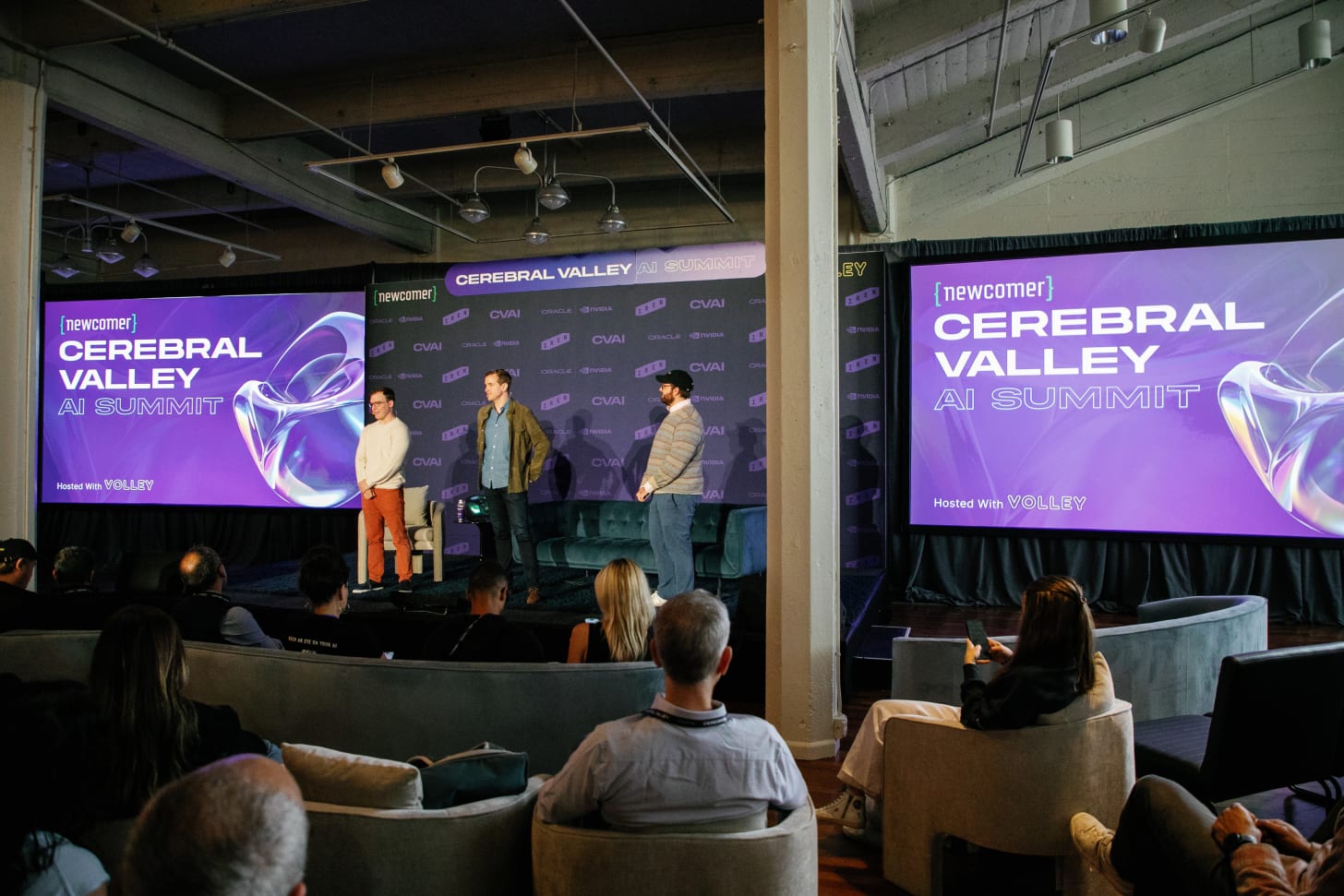12 Videos from CVAI: Amjad Masad from Replit, Mike Krieger from Anthropic, xAI co-founder Jimmy Ba & More
Listen to our on-stage panels from the Cerebral Valley AI Summit
We just wrapped the Cerebral Valley AI Summit in San Francisco last week.
All 300-plus of our attendees heard from AI leaders like Replit’s Amjad Masad, Kleiner Perkins investor Ilya Fushman, solo capitalist Elad Gil, and Anthropic’s chief product officer Mike Krieger, alongside leaders from Box, Vanta, Harvey, ElevenLabs, and more.
We’re also sharing footage from our first-ever audience participation segment, where hosts Eric Newcomer, Max Child, and James Wilsterman tried to guess our audience’s AI predictions.
We’re sharing all 12 talks from last week’s summit in the newsletter. You can also watch them on our Newcomer Summits YouTube channel.
MongoDB.local San Francisco is happening on January 15th.
This is an event for founders and developers building modern, data-driven applications.
You’ll learn about technologies, tools, and best practices that make it easy to build and scale modern applications without complexity.
Plus, attendees will hear directly from experts and innovators who are using MongoDB to power the next wave of AI applications.
Learn more and register here →
Jimmy Ba (xAI)
Jimmy Ba almost didn’t make his panel, he shared on stage, after his Tesla self-driving ride took a wrong turn and ended up on the Bay Bridge.
Once he finally made it, he gave the audience a peek under the curtain at how Elon Musk steers his other cofounders and employees. He touted having X as one of the largest repositories of valuable, human-crafted training data for xAI’s Grok models.
Amjad Masad (Replit)
Replit’s Amjad Masad kicked off the summit on the heels of his company’s explosive growth in the year since the phrase “vibe coding” was coined.
Masad shared how he’s been seeing his tools produce unbelievable value for his customers — two companies that were built on Replit have already reached unicorn status, including MagicSchool. Replit’s tools can help engineers do more than just basic software writing now, and are allowing businesses to build agents on the fly.
Mike Krieger (Anthropic)
Anthropic has been positioning itself as an “anti-slop” AI company, and Mike Krieger explained how the company is designing its chatbots to avoid the sycophancy that many others have been criticized for.
“When we were testing Sonnet 4.5, one of the things that people got most excited about was when Claude was like, ‘this idea is bad.’ Not that you should feel bad about it, but like ‘this idea is not a good direction,’” Krieger said. “That pushback is not just valuable in a personal relationship-with-AI-sense. It’s actually how you get good work out of the models.”
Cristina Cordova (Linear), Tuhin Srivastava (Baseten), and Eoghan McCabe (Intercom)
Linear, Baseten, and Intercom have all taken different approaches for pricing their AI product offerings.
Linear’s Cristina Cordova said her team has embraced a hybrid approach, with some priced based on individual seats and others that subscribers can test out for free.
Eoghan McCabe broke down how Intercom landed on outcome-based pricing, where customers will only be charged if AI agents solve their customer support issues. This model has been praised by many peers in Silicon Valley.
As a founder focused on AI infrastructure, Tuhin Srivastava from Baseten has chosen to only charge based on how much customers are using his service, but added that he’s considering exploring outcome-based pricing as well.
Ilya Fushman (Kleiner Perkins) & Elad Gil (Gil & Co.)
Ilya Fushman wasn’t particularly troubled by the insinuations that this AI investment frenzy is a bubble, noting that some of tech’s most enduring companies were born out of hype cycles.
In fact, Gil feels the foundation model companies still have room to grow: “If you think they can still be 5 or 10x bigger, maybe you should still be investing in them right now.”
Parag Agrawal (Parallel Web Systems)
AI agents were at the top of everyone’s minds throughout the summit, yet many founders and investors are still working out how to make them work as promised.
Parag Agrawal is among those building infrastructure for a future influx of agents. He announced a new $100 million funding round for his startup Parallel Web Systems, which is building a web API tailored for agents.
Andy Konwinski (Laude)
As a cofounder of Databricks and Perplexity, Andy Konwinski advocated for American AI labs to take open-source model research more seriously stateside, now that China is making major gains in the field.
He argued that the topic has implications not just for the future of AI research and development in the US, but the future of an open society.
Guillermo Rauch (Vercel)
Vercel founder Guillermo Rauch offered up a vision for how the internet will change in the age of AI agents. “I think we’re moving into a world that’s a lot more event driven or workflow driven,” he said.
A proliferation of agents on the web will mean that humans will no longer need to manually open up websites or applications in order to complete tasks, since the agents will be able to do this automatically.
Winston Weinberg (Harvey)
Harvey founder Winston Weinberg didn’t see a future where AI replaces most human white collar work in the next few years.
His legal AI startup Harvey, which makes AI applications for lawyers, is growing by being the in-between service provider for law firms and their enterprise clients, rather than taking over legal work entirely.
Mati Staniszewski (ElevenLabs)
Another major theme of the conference centered around how AI will move beyond the chatbox as its primary interface. Voice is a growing alternative with lots of momentum.
ElevenLabs co-founder Mati Staniszewski predicted that more than 50% of customer support calls will be handled by voice AI agents in as little as 18 months.
Audience Quiz Game with Summit Hosts Eric Newcomer, Max Child & James Wilsterman
For the first time this year, the Cerebral Valley hosts polled our audience in advance about which AI startups were worth the hype and where they see AI progress heading in the next few years. It turns out that our bullish audience was a bit more restrained when given anonymity!
In our on-stage game, respondents predicted that OpenAI would only increase revenue by $10 billion over the next year — a figure that’s decidedly more modest than some AI boosters would have you believe. You can see the full survey results here.
Christina Cacioppo (Vanta) & Aaron Levie (Box)
Enterprise software companies are embracing agents, said Box’s Aaron Levie and Vanta’s Christina Cacioppo, but they aren’t letting them run completely wild just yet.
Levie said that the biggest focus for his team is to train the agents to know when to surface certain work results or questions to their human managers.
Cacioppo framed agents as something of a no-brainer for corporate functions like compliance, but there still need to be a lot of humans in the loop.
Mayor Daniel Lurie (City and County of San Francisco)
We were excited to welcome San Francisco Mayor Daniel Lurie to Cerebral Valley, who touted how the city is in the middle of an AI-fueled resurgence.
Lurie shared that his office is utilizing AI tools for various tasks in-house as well. “We’re the home of AI — we should be using it at city hall, and we are.”




